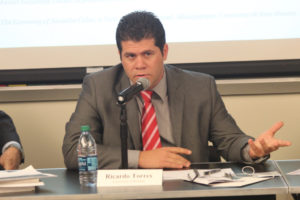
Questions about the PYMES in Cuba
HAVANA — The purported approval of private businesses by the Cuban government was some days ago the object of intense media misrepresentation, after the publication in Cuba of two of the documents discussed during the recent Seventh Congress of the Cuban Communist Party, which will be debated in the future with “broad sectors of society.”
As a result of the commotion raised by the foreign media, two things became clear: the number of accumulated questions that we need to answer, and the postponement of a national discussion about the eventual legalization of private property in a country that is trying to advance on a socialist track.
Hoping to begin to provide some answers, or at least add some viewpoints to the debate, the economist and Progreso Semanal contributor Ricardo Torres offers his first impressions about this measure, which — though not approved, as the major media affirmed some days ago — is surely on the table for discussion.
–Private enterprises in a socialist project?

“This step should not necessarily be seen as a drifting away from the socialist project. In theory, Cuba does not live in socialism; it has never gone beyond the stage of transiting toward that model.
“In that stage, diverse forms of property coexist, including private property, therefore, it is neither a step back nor an undesirable act. The accelerated development of the productive forces is a historic need of socialism and requires diverse forms in the conditions in which the Cuban economy is developing.
“Another way of seeing it could be that, given the impetus that this sector has gained, it is advisable to adopt more sophisticated schemes to regulate its participation, and that includes granting them legal status as businesses. In practice, they are already businesses, not self-employed entrepreneurs, which was the assumption behind the current arrangement — which in fact has been overtaken by circumstances.
“In other words, most of these entities are legal, except that they operate under an umbrella that has grown small or that existed to limit their expansion. Self-employment is a figure that exists in all countries, but what we have today in Cuba surpasses that category by far.
“However, the document makes it very clear that the private sector will be a complementary segment to other forms [of property], among which the State-owned enterprises will continue to be dominant.
–Limits, obstacles
“Let us recall the moment in which we live. There is a project that will be raised for discussion by the Cuban people and subsequently adopted by the Central Committee of the Cuban Communist Party. This is the political level. Later, it will be up to the National Assembly of the People’s Power and the Government to determine how these changes will be implemented.
“This is the key. What is finally approved may be very ambitious or limited, depending on the legislation that implements it and, as always, on the interpretation of the people and institutions.”
–Possible impact
“That depends on the practical form that this change assumes. The implementation will decide the reach and limitations of these transformations. Many important implications may surface.
“For example, many regulations were conceived under the assumption that the only legal persons in Cuba were state-owned businesses or cooperatives. If that status is given to several private entities, it would imply that they could access a whole world of possibilities. Will that happen? Or will the regulations be revised to explicitly exclude the new Cuban private enterprises?
“I don’t know. I would hope that this is not the case, but we have to wait and, above all, caution against the risks implied in a discriminatory process of that nature.”
–Economic and legal viability
“This is a very broad field that goes beyond the purely economic aspect. The idea, as I see it, is to gradually level the playing field for all the productive forms in the nation, so that the productive factors and resources of all kinds may be assigned according to criteria of economic efficiency and social welfare.
“This will necessarily be a process that needs to be accompanied, for example, of modifications in the macro-economic environment, particularly the monetary-exchange environment.
“In this new scenario, indirect regulation through monetary and fiscal instruments would take a more relevant place in the management of the economy, above the mechanisms of an administrative type.”
–Social inequality
“A major concern about the private activity has been the exacerbation of inequality. In Cuba there is a process of stratification of society according to income, which responds to a broad and complex whole of diverse factors that are interconnected.
“This was acknowledged by President Raúl Castro in his opening speech at the CCP Congress. And it happened despite attempts of every kind to frame or limit private enterprise. What happens is that the practice overtakes the wishes.
“I believe that to assume an existing reality can be positive when acting on this new stage. In turn, it can give the Government new legal instruments to regulate private participation and guarantee a fair contribution to the common good.”


